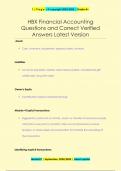Exam (elaborations)
HBX Financial Accounting Questions and Correct Verified Answers Latest Version
- Course
- Institution
Assets Cash, inventory, equipment, prepaid assets, invoices Liabilities Accounts payables, salaries, sales taxes payable, unredeemed gift certificates, long term debt Owner's Equity Contributed capital, retained earnings Module 4 Explicit transactions triggered by some sort of activity...
[Show more]



